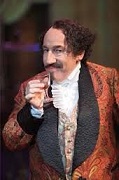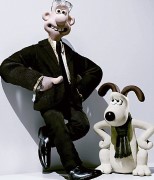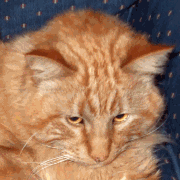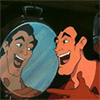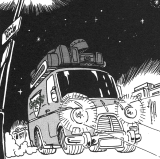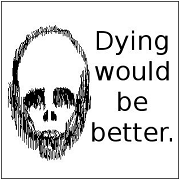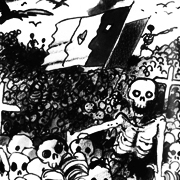|
chernobyl kinsman posted:Please post an example of a story you think has no theme Tender Buttons
|
|
|
|

|
| # ? Jun 3, 2024 14:58 |
|
AFancyQuestionMark posted:Didn't know this. Can you point me towards mags that regularly feature good or interesting pieces? Tin House is good, but they're publishing their last issue in June. They'll still publish some stories online, though.
|
|
|
|
Mrenda posted:I feel I'm somewhat to blame for the idea that the best (fantasy) work is themeless, messageless, meaningless. If you squint a bit at what I said you could come across that idea, maybe. I'm more saying that the author (and the author's idea for the work), the story, and the text the reader constructs are all distinct stages with less influence over each other than many would commonly assume. Every work has themes, message, meaning, even if that message isn't high brow, smart, correct, it doesn't have to be about some giant problem humanity faces that your lit professor would talk about, it could be something very simple, love/revenge/improving oneself, these are all fairly common themes even in uhhh the absolute trash I sometimes read on KU. Most of the times these arn't written to be like a message to the reader, but to get them involved in the story and go yeah I have felt this way before so that they can relate to the characters and the situations they are in. AFancyQuestionMark posted:I am surprised we haven't seen the return of short-story magazines or even serialized fiction to any meaningful extent, which are forms that more easily allows for experimentation with new styles and narratives than either traditional publishing or self-publishing avenues. With the latter two, an author has to find an audience that is receptive enough to their stuff to be willing to pay for it and sustain their writing, so anything kind of has to rely on familiar genres that would appeal to specific audiences for marketing purposes. But with, say, a monthly magazine of shorter pieces, authors could spend much less time and effort on each work, thus reducing the pain if any single story doesn't pan out. So there's much more room to experiment with fresh ideas in this format. Serialized fiction is back and in a big way, it's just all self-published crap online, it's slowly becoming a bit more curated and some of them are even *gasp* starting to get editors but for the most part the cycle goes write some serialized webnovel nonsense that goes on for a while, if it does well go back rewrite parts > get an editor > publish on KU. Ohh and in China where it sorta is published the whole time it's really not any better except they force their authors to stick to a schedule of like 5+ releases a week, and are encouraged to write poo poo that goes on forever so it's kinda worse overall.
|
|
|
|
chernobyl kinsman posted:Please post an example of a story you think has no theme Have you ever read any surrealist fiction?
|
|
|
|
chernobyl kinsman posted:all communication, all art, has "ideas" in it. they're not just something added in by the artist to make it more relatable, they are an inevitable feature, whether consciously wrought by the artist or not I reject the idea that art is fundamentally about communication. That may be where this confusion comes from.
|
|
|
|
TheGreatEvilKing posted:Your art argument is laughable because there is actually a lot of thought and technique that goes into any art, and it doesn't spring from The Artist via divine inspiration. I never claimed otherwise, so again this is responding to something you read into the post, not what was there. Also, I disagree that all art is not from divine inspiration or whatever you want to call it. The element of unconscious inspiration has always been fundamental to art, though of course it needs to be buttressed by conscious effort, technique, and maybe sometimes theory (though I think this last one is less essential). In fact the idea that art is not born of divine inspiration is a relatively recent one.
|
|
|
|
chernobyl kinsman posted:ya you are right that covenant's struggle with impotence and inaction presents another theme. saying "the story has environmentalist themes" is not saying "the story is only about environmentalism and has no other themes, or that it is an "environmental text", whatever that even means. i also don't know what an "appeal to theming" means. you seem to be looking for one single analysis that encompasses all possible meanings within the text, and that is a priori impossible. discussing one aspect of the text does not preclude there being other aspects to the text. the map is not the territory. an analysis that contains all the meaning of the original text would be the text itself. this is basic New Critics, Cleanth Brooks poo poo. So, I'm going to demonstrate that analyzing the Chronicles in terms of what themes it has is not an interesting critical enterprise, by showing what you would need to do for this to be coherent. Your solution to the problem that environmentalism isn't a consistent overarching theme in the Chronicles is to posit that it is one among many. Impotence is another. OK, fine, let's take that logic through to its conclusion. What are the themes of the Chronicles of Thomas Covenant? Positive character traits without redemption Covenant is a rapist. At no point is he ever forgiven for this, nor is it ever implied that any of his actions in the slightest pardon him for what he's done. In fact, each time he returns to the Land, he is faced with more and worse consequences of his initial actions. Nonetheless, it's simply a fact that he does a huge amount of good through what might be called a heroic effort. Can awful people still do heroic things, without in any way diminishing what they've done? Impotence as strength Covenant is impotent, both literally and metaphorically. He is cured of his literal impotence twice on entering the Land, but even this runs out on his third entry. Yet, it is precisely because he is incapable of so many things that he eventually ends up to be the person uniquely suited to solve the problems he's faced with, and it is part of why the man in the robe chooses him for his task. This is shown most obviously by his foil, Hile Troy, who possesses a certain kind of confidence and competence, the very exercising of which leads to his downfall. Covenant is able to escape these pitfalls because of his reticence and lack of power. The relation between the metaphysical status of the world and ethics This is the theme most explicitly spelt out by the author, in the note first given to Covenant: to test a man's moral mettle, see what he does when he thinks the world isn't real. Covenant shows one answer to this question when he rapes Lena, thinking she isn't real. He shows the other when he destroys Foul, even though he still isn't convinced the Land is real. What does it matter what you do, if the world isn't real? Does the metaphysical status of the world void ethical responsibilities? The temptation to self-destruction This is explored through the Ritual of Destruction, performed first in the mythical past by Kevin Landwaster, then contemplated by Mhoram and attempted by Lena's dad. It seems to mirror the desire to commit suicide by Covenant. As Covenant always finds a way not to kill himself even under the decay of his own body, the stewards of the Land always manage not to succumb to the temptation to destroy what they love when it is hurting. Is it possible that life can be worth living, and not abandoning, even when there is no particular part of it that is good? The struggle between good and evil A holdover from Tolkien, this is explored through Foul's attempt to destroy the land and its inhabitants. The Chronicles' villains are not gray; they are not anti-villains. They are not fleshed out with character arcs, they do not elicit sympathy from the reader, and they do not pull punches. Nor are their actions meant to be in any way alluring or tempting. They are just loving horrible, and kill, inhabit people's bodies, commit genocide, and destroy the countryside. They are evil because they are quasi-natural forces (as with the ravers) or because their character is thoroughly corrupt (as with foul). The Chronicles apparently affirm the presence of real, objective evil in the world and the possibility of curbing it through conscious effort. The inversion of fantasy Written in reaction to Tolkien at the start of fantasy as a mass-marketable commercial genre, the Chronicles loosely mirrors the structure of the Lord of the Rings Trilogy, but deliberately turns much of it on its head. It also explores what happens when one takes seriously the idea that a world like Middle Earth has 'real-world' inhabitants in it. And so Covenant comes off as more psychologically fleshed out than those surrounding him, who seem like wooden caricatures by contrast – this to show what would happen if someone from 1970's America actually conversed with a Tolkien character. What happens when you try to treat a fantasy world as if it were real is also demonstrated through the forced march of Hile Troy. The question of the reality of the world Covenant never resolves whether the Land is real – any reading of the book that claims it unequivocally is or isn't by the end of the story, or that Covenant holds to one of these two options, is missing something very basic. Covenant is able in part to succeed because he does not take the world seriously – he dispels the visage of Elena by affirming that she is not real. Yet he needs to take the world seriously as real in order to care about it enough to save it, and indeed it has to be real to the extent that it can be saved. Thus, Covenant's adventure only makes sense insofar as the world can both be given credence and doubted at the same time. Homelessness The giants are eternal wanderers, and left without a permanent home; they then lose their home away from home when they are all killed. The Bloodguard are also permanently displaced from their native lands. Covenant is likewise, and has nowhere to go back to. The banality of literature Covenant is an author of mainstream literary fiction, of the sort read by fashionable middle class (probably New Englander) women in book clubs in the 1970s. After his experiences with leprosy, his literary work comes to seem trite to him, despite its bestselling status, and he can no longer write. He is not a genre author; though living in the 1970's, he is apparently unaware of Tolkien, and never makes metafictional references to fantasy literature while living in a literal fantasy world. His experiences with writing are ultimately hollow and never help him, so much so that we never even know what it is he wrote about, nor does he reflect on this seriously as an aid to his adventures. Only a fantastical experience outside of his literary mode eventually gives him the ability to write again. The (mis)treatment of nature The Land is sick and dying, and needs to be made healthy again. Covenant acknowledges that in his own world, the 'environment' is treated basically as scenery. The inhabitants of the Land are fanatical in their devotion to this restoration, which acts as a foil to American apathy. --- Our list is getting quite long, and we're not even close to done. Shall we keep going? How many hundreds could we list? But then, this is starting not to look like an interesting analysis of the book, because it misses what it fundamentally is. Fundamentally, the book is like a person, a multifaceted creature with its own artistic form. It makes as little sense, then, to appreciate it through the lens of themes in this way, as it does to appreciate a person in this way. We can imagine 'personality traits' of people in retrospect, as a loose schematic way of understanding 'what they are like' or 'what they are about,' but this is not a serious way to understand or interact with a person. Likewise with a story – much of these things are there for no reason, many of them do not overlap or converge, and a good deal probably reflect whatever the author happened to be thinking about or happened to have grown up with. If asked 'what is the Chronicles about,' the list above, and the hundreds of entries I could continue with, are simply not that interesting. And so I hold that any book that could be substantively described in such a way is similarly uninteresting. If we take say The Worm Ouroboros as the work of fantasy par excellence, and ask what its themes are – this seems to be a very stupid question. And reading the book will make it clearer why.
|
|
|
|
It could just be that the Covenant books themselves aren't very interesting.
|
|
|
|
pospysyl posted:It could just be that the Covenant books themselves aren't very interesting. I respect that opinion, even though I like them. I probably wouldn't recommend them to most people. But anyway, the point was just that thematic analyses of a book tend to be like thematic analyses of say, a century or a person. Understand why the latter are silly, and you understand why it's silly for a book – unless for some reason you think a book is more schematic or banal than these other things. The idea that a work of art is primarily about communication, or that its form is subordinate or even equally important to its function, or that its core isn't meant to be inspired, aren't encouraging in this regard. But I'll let people speak on their own behalf who want to defend these beliefs, and tell me if I've misunderstood them.
|
|
|
|
Willfully ignoring people's points isn't misunderstanding them.
|
|
|
|
chernobyl kinsman posted:discussing one aspect of the text does not preclude there being other aspects to the text. the map is not the territory. an analysis that contains all the meaning of the original text would be the text itself. this is basic New Critics, Cleanth Brooks poo poo.
|
|
|
|
The long post above was in address to this. Multiplying themes doesn't solve the problem, but only highlights it if you take that approach seriously. I take it that this is not a serious approach, but only said as a riposte to the objection.
|
|
|
|
Nerdburger_Jansen posted:Have you ever read any surrealist fiction? have u
|
|
|
|
We’re living it.
|
|
|
|
CestMoi posted:have u Yeah, but only a little. I liked the Manifesto/s a lot, and it gears more towards what I had hoped fantasy would be initially. It is better at articulating what I have in mind, so that's why I brought it up.
|
|
|
|
Nerdburger_Jansen posted:The idea that a work of art is primarily about communication Whose claim is this?
|
|
|
|
So you’re comparing analyzing books to people and their personality traits, and saying that’s not serious. Are you against psychology because it classifies people? When we talk about themes we’re talking about one aspect. You can mine a lot out of a work. The themes are just part of having a greater understanding of a text and how it functions.
|
|
|
|
Is there really a character in the Thomas Covenant books named "Kevin Landwaster?" Honest to loving God?
|
|
|
|
Antivehicular posted:Is there really a character in the Thomas Covenant books named "Kevin Landwaster?" Honest to loving God? I believed Lord Foul and Drool Rockworm even though they sound like Power Rangers villains but I absolutely refuse to believe this. The Thomas Covenant books aren’t real and you’re all trolling me.
|
|
|
Nerdburger_Jansen posted:So, I'm going to demonstrate that analyzing the Chronicles in terms of what themes it has is not an interesting critical enterprise, by showing what you would need to do for this to be coherent. Your solution to the problem that environmentalism isn't a consistent overarching theme in the Chronicles is to posit that it is one among many. Impotence is another. OK, fine, let's take that logic through to its conclusion. im gonna be honest with you man im not reading all that
|
|
|
|
|
I read it, and it includes the sentence "the giants are eternal wanderers, and left without a permanent home; they then lose their home away from home when they are all killed," which makes me nostalgic for bad middle-school book reports.
|
|
|
Nerdburger_Jansen posted:So, I'm going to demonstrate that analyzing the Chronicles in terms of what themes it has is not an interesting critical enterprise, by showing what you would need to do for this to be coherent. Your solution to the problem that environmentalism isn't a consistent overarching theme in the Chronicles is to posit that it is one among many. Impotence is another. OK, fine, let's take that logic through to its conclusion. So if your point that bad thematic analysis is bad then I'm there with you, 100% Because holy hell.
|
|
|
|
|
Nerdburger_Jansen posted:If we take say The Worm Ouroboros as the work of fantasy par excellence, and ask what its themes are – this seems to be a very stupid question.
|
|
|
|
Nerdburger_Jansen posted:Have you ever read any surrealist fiction? surrealism was just guys being random and so it doesn't have any themes. thanks to every body for reading my post and catch you on the flip side
|
|
|
Nerdburger_Jansen posted:Have you ever read any surrealist fiction? please post a particular example of surrealist fiction that you think has no themes
|
|
|
|
Nerdburger_Jansen posted:I never claimed otherwise, so again this is responding to something you read into the post, not what was there. Your argument was that stories resonate with people and they don't know why. I am attempting to explain that the use of actual literary techniques, and not incoherent randomness thrown on the page to feel right, is why. An aesthetic does not exist in a void of ideas.
|
|
|
|
|
Antivehicular posted:I read it, and it includes the sentence "the giants are eternal wanderers, and left without a permanent home; they then lose their home away from home when they are all killed," which makes me nostalgic for bad middle-school book reports. I don't think you understood the point of the post.
|
|
|
|
A human heart posted:surrealism was just guys being random and so it doesn't have any themes. thanks to every body for reading my post and catch you on the flip side That's not what I said; you are responding to what you've read into the post, not what's there.
|
|
|
|
TheGreatEvilKing posted:Your argument was that stories resonate with people and they don't know why. I am attempting to explain that the use of actual literary techniques, and not incoherent randomness thrown on the page to feel right, is why. An aesthetic does not exist in a void of ideas. These responses are all so strange – is it me you're responding to? I don't recognize it, if so. Anyways, nothing I've been saying is even all that controversial or interesting, so the disbelieving and angry reactions are a little tedious. If you're not familiar with any way of engaging with fiction other than thematic analysis, fine, but blowing up over it is not a good look.
|
|
|
|
please don't post 6 times in a row again
|
|
|
|
If everyone else is misunderstanding you, maybe you're not being as clear as you think you are?
|
|
|
|
|
lofi posted:If everyone else is misunderstanding you, maybe you're not being as clear as you think you are? It could be, but the tone of the posts is pretty angry and incoherent. If I'm being unclear, then a question, and not fuming at something that you thought I said, would be the appropriate reaction.
|
|
|
|
why don't you think the surrealists had themes, especially since you've not read many of them?
|
|
|
|
Nerdburger_Jansen posted:It could be, but the tone of the posts is pretty angry and incoherent. If I'm being unclear, then a question, and not fuming at something that you thought I said, would be the appropriate reaction. To be fair I think some posters are strawmanning it up, but you're kind of among them, brother. See: my last question.
|
|
|
|
A human heart posted:why don't you think the surrealists had themes, especially since you've not read many of them? I'm not going to say that the surrealists didn't have themes, but the surrealist ethos as outlined in the manifestos is to treat the disinterested play of the imagination as superior to discursive content. To treat a work thematically is to treat it, as someone here put it, as having 'something to say.' But the surrealist sees what is said as inferior to the juxtaposition of ideas arising from the subconscious. These might be interpreted in retrospect, but this is not what makes a work of art interesting. This is why the work is liberatory – it offers a return to the imagination as disinterested, and genuinely creative rather than reflective of the milieu in which the thought takes place, or what's to 'be said about it.' And so applying this to the Tolkien comment, of course there is some reaction against the industrial revolution in the Lord of the Rings, but this is just not what makes the work interesting, and missing this is going to make you miss what's interesting about fantasy. This is just my lay read on it. And the surrealists were of course aware of their relation to the fantastical and the childlike, which the fantasy genre also has a close relation to. The child is capable of making, and enjoying, a 'story for its own sake.'
|
|
|
|
i'm loving furious. i've had enough and i'm not going to take it anymore
|
|
|
|
In an attempt to stop being angry and incoherent, are you defending modern fantasy such as Rothfuss, Jordan, et al, or are you defending fantasy as a genre that deserves to exist? I think a fair amount of posters (at least I was) are reading your posts as a defense of fantasy being mysteriously exempt from having to actually have any literary characteristics because it's a fantastical story. Can you articulate what you see as interesting about fantasy?
|
|
|
|
|
pikachode posted:i'm loving furious. i've had enough and i'm not going to take it anymore Ganbare, pikachode-san.
|
|
|
|
Surrealism happened at a certain point in time and its ethos reflects the time and milieu an sich. its "liberation" is an illusion at best
|
|
|
|

|
| # ? Jun 3, 2024 14:58 |
|
Ras Het posted:Surrealism happened at a certain point in time and its ethos reflects the time and milieu an sich. its "liberation" is an illusion at best Yeah also nobody really read Breton's manifesto(s) even within the surrealists, because he was a bell end
|
|
|

